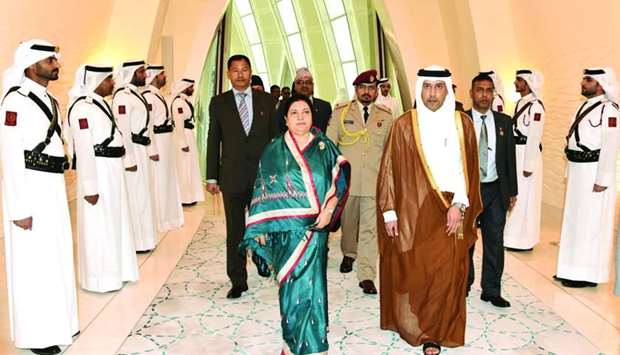His Highness the Amir Sheikh Tamim bin Hamad al-Thani is expected to meet the president of Nepal Tuesday to discuss bilateral relations and means of boosting them, in addition to a number of regional and international issues of common concern.
The visit and the discussions are expected to contribute to the promotion and development of relations between the two countries, and opening many areas for more growth and development, especially in energy, investment and trade.
The Qatari-Nepalese relations date back to more than 30 years. The two countries established diplomatic relations in 1985. The embassy of Qatar was officially opened in Kathmandu on 10 September 2012. The two countries' relations have always been growing and developing on the basis of mutual respect and the pursuit of international peace and security.
In 2011, the then Nepalese president, Dr Ram Baran Yadav, paid a visit to Qatar. In 2005, the then minister of foreign affairs of Nepal Ramesh Nath Pandey visited Qatar. The relations between the two countries include a range of agreements and memorandums of understanding. They include an agreement on avoidance of double taxation and prevention of financial evasion signed in 2007, an agreement between the governments of the two countries on air services, an agreement on economic, commercial and technical cooperation signed in 2005, an agreement regulating the employment of Nepalese workers in Qatar signed in 2005, a memorandum of understanding between the two foreign ministries signed in 2005, and a memorandum of understanding between Qatar Chamber of Commerce and Industry with its Nepalese counterpart signed in 2005.
On April 26, the two chambers signed a memorandum of understanding aimed at enhancing co-operation and creating economic partnerships between businessmen in both countries. It also aims to further push forward trade relations between the two sides to increase the volume of trade, especially since Nepal has made great progress in developing its economy in various sectors, particularly agriculture, industry and tourism.
In November 2015, the National Human Rights Committee signed a memorandum of understanding with its Nepali counterpart to establish and facilitate the relationship between the two committees to promote close co-operation and exchange of information and bilateral contacts, especially in the field of labor rights. The MoU stated that the two parties would work to build capacity in Qatar and Nepal through the implementation of training and education programs for workers at the level of relevant ministries and other agencies, as well as staff members of the two organisations, particularly on issues related to the rights of Nepalese workers.
The memorandum also stated that the two parties shall work to educate workers, employers, managers, employment officials, developers and diplomatic missions about the labor rights issues on existing legislation and international agreements, and the ILO labour conventions.
The Qatar Football Association (QFA) signed a five-year collaboration agreement with the All Nepal Football Association (ANFA) on October 23. The agreement brings QFA and ANFA closer as they look into ways and means to develop the world’s biggest sport.
The trade relations between Qatar and Nepal have been growing continuously, as Nepal's primary exports to Qatar include garments, textiles, magnetic cylinders, vegetables and others, while Nepal imports polyethylene, polypropylene, and some food products from Qatar.
There are an estimated 400,000 Nepalese workers in Qatar workers who are involved in building the Qatari development and in infrastructure projects and major projects sponsored by the State of Qatar in various fields. There are direct flights between Doha and Kathmandu due to the large numbers of Nepalese workers in the country.
Nepal is located between India and China, an inland country with no coastline and no external seafront with an area of more than 147,000 square kilometers, with an estimated population of more than 29mn. The land of Nepal is rugged and mountainous and consists of high chains with the highest mountain peak in the world, the Everest (8,888 meters above sea level).
Agriculture is the main occupation of three-quarters of the population, accounting for 34.9% of GDP, while industrial activity is concentrated in the manufacture of agricultural products.
Agriculture, tourism and remittances of Nepali workers abroad are the mainstays of Nepal's economy and national income. The country has enormous potential for investment in various fields such as water, infrastructure, tourism, mining and hydropower.
Tourism accounts for about 24% of Nepalese national income, mountainous areas and surrounding valleys are characterised by scenic landscapes and Europeans and Asians tourists come for mountain climbing. The Republic of Nepal opens its doors to investors and stresses that it is full of promising investment opportunities, especially in the field of hydropower, infrastructure, agriculture and tourism.

Nepal's President Bidya Devi Bhandari is being greeted by HE the Minister of Administrative Development, Labour and Social Affairs, Dr Issa Saad al-Jafali al-Nuaimi, the ambassador of Qatar to Nepal, Yousuf bin Mohamed al-Hail and Nepal's ambassador to Qatar Ramesh Prasad Koirala.
President of Nepal Bidya Devi Bhandari's official visit to Doha, which began Monday, is within the framework Qatar's keenness on developing and enhancing co-operation with friendly countries in various fields to serve common interests, goals and aspirations.
